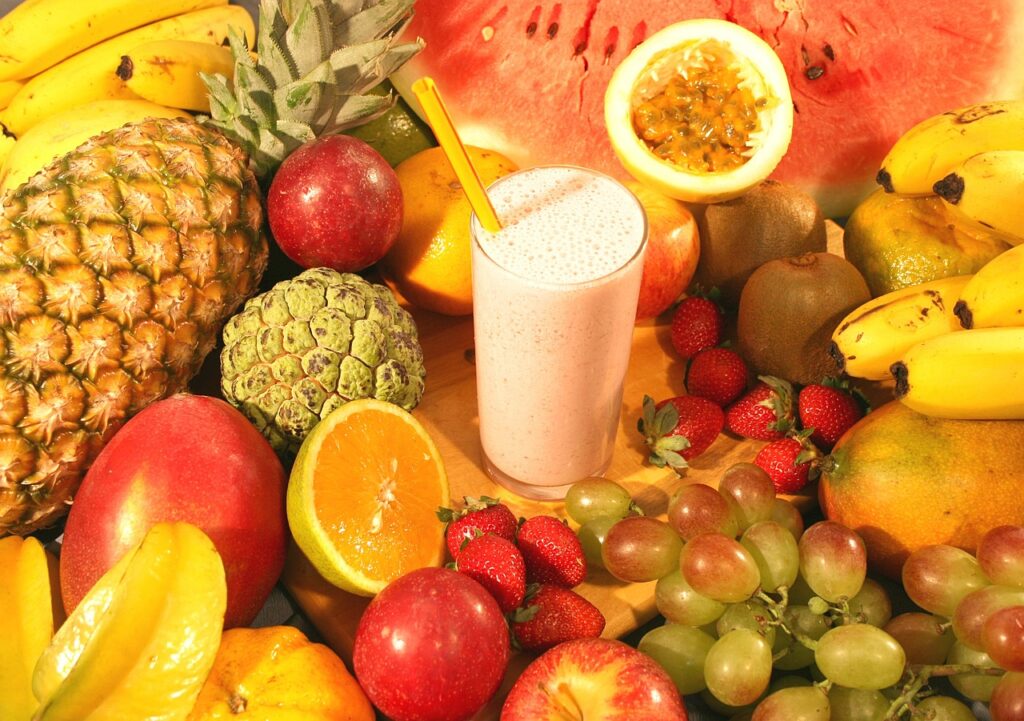Fat-soluble vitamin A is important for supporting many body processes. It is important for cellular communication, immunological system support, and vision. Preformed vitamin A (retinol and its esterified form, retinyl ester) and provitamin A carotenoids (such beta-carotene) are the two main sources . Provitamin A carotenoids are abundant in vibrant vitamin A fruits and vegetables, but also found in animal products.
Benefits
With so many health advantages, it is plays a key role in maintaining general health. Among the major benefits are;
- Vision Enhancement: It is essential for maintaining healthy eyes and optimal vision. It aids in the formation of rhodopsin, a light-sensitive receptor in the retina.
- Immune System Support: This vitamin plays a key role in supporting the immune system, helping the body attack against infections and diseases.
- Skin Health: This vitamin is essential for skin health, promoting cell growth and regeneration. It is a common ingredient in skincare products for its ability to combat signs of aging.
- Reproductive Health: Vitamin A fruits and vegetables is vital for reproductive health in both males and females. It is essential for the development of sperm, eggs, and the placenta.
- Bone Health: It also contributes to bone health by supporting in the maintenance of healthy bones and teeth.
Deficiency
Although its importance, its deficiency poses a threat to global health, particularly in developing countries. The body’s functions may be impacted by the deficiency, which can lead to major health problems.
Deficiency Symptoms
Knowing the symptoms of vitamin A deficiency is important for timely intervention. Common signs include:
- Night Blindness: Impaired vision in low-light conditions is a classic symptom of Vitamin A fruits and vegetables deficiency.
- Dry Eyes: Dry and irritated eyes can be indicative of insufficient levels of vitamin.
- Skin Issues: Dry and rough skin, as well as an increased susceptibility to infections, may signal a deficiency.
- Respiratory Infections: This vitamin deficiency compromises the immune system, making individuals more prone to respiratory infections.
Vitamin A Toxicity
While this is vital, excessive intake can lead to toxicity, causing various effects on health. It’s important to maintain a balance intake.
Supplements
For individuals struggling to meet their requirements through diet alone, supplements can be a viable option. However, it’s vital to consult with a healthcare professional before starting any supplementation treatment to avoid potential complications.
Functions
Vitamin A fruits and vegetables serves many functions within the body, contributing to:
- Vision: As mentioned earlier, it is crucial for optimal vision, particularly in low-light conditions.
- Cellular Communication: It supports cell communication, playing a role in gene expression and cell differentiation.
- Immune Response: Help strengthens the immune system, aiding in the defense against infections.
Vitamin A Palmitate
Synthetic vitamin A palmitate is frequently found in fortified foods and supplements. The body absorbs it with ease and transforms it into the active forms of this vitamin.
Vitamin A Swim
While the term “Vitamin A swim” might sound exciting, it’s important to note that there’s no specific association between vitamin A and swimming. However, regular physical activity, including swimming, can contribute to overall health, indirectly supporting the body’s nutritional needs.
Vitamin A fruits and vegetables
A well-balanced diet is necessary for obtaining an adequate amount of vitamin A. Following Vitamin A fruits and vegetables should be into your meals:
- Animal Sources: Liver, fish, eggs, and dairy products are rich in preformed it.
- Colorful Vegetables: Carrots, sweet potatoes, spinach, kale, and other colorful vegetables provide provitamin A carotenoids.
- Vitamin A Fruits and vegetables: Mangoes, apricots, and cantaloupes are excellent sources of beta-carotene.

Rich Foods
For those meeting on increasing their intake, here are some specific Vitamin A fruits and vegetables as foods to consider:
- Sweet Potato: Packed with beta-carotene, sweet potatoes are a nutritious and delicious choice.
- Spinach: This leafy green is not only rich in iron but also provides a good dose of vitamin.
- Carrots: Known for their beta-carotene content, carrots are a crunchy and satisfying snack.
- Liver: If you consume animal products, liver is a powerhouse of preformed it.
Toxicity Symptoms
Excessive intake can lead to toxicity, with symptoms including:
- Nausea and Vomiting: Overconsumption of this vitamin may cause nausea and vomiting.
- Dizziness and Headaches: Toxic levels of it can lead to dizziness and headaches.
- Skin Changes: Skin discoloration and peeling are common symptoms of vitamin A toxicity.
- Bone Pain: Excessive can negatively impact bone health, causing pain and discomfort.
Vitamin A for Acne
There is some evidence suggesting that this vitamin, particularly in the form of retinoids, can be beneficial for managing acne. Retinoids help regulate skin cell turnover and prevent the clogging of pores, reducing the rate of acne.
Vitamin A Serum
Vitamin A serums, often containing retinol or other derivatives, are popular in skincare routines. These serums are designed to promote skin renewal, reduce wrinkles, and improve overall skin texture. It’s advisable to start with a lower concentration and gradually increase to avoid irritation.
Overdose consumption
While rare, an overdose of vitamin A can have severe consequences. It’s essential to be cautious with supplements and monitor your dietary intake to prevent reaching toxic levels.
Rich Foods
Incorporating a variety of vitamin A-rich foods into your diet can help maintain ideal levels. Consider including:
- Cod Liver Oil: A potent source of preformed this vitamin.
- Butternut Squash: Packed with beta-carotene, this versatile vegetable is a nutritional powerhouse.
- Kale: Along with other leafy greens, kale provides a substantial amount occur.
- Eggs: Particularly the yolk, which contains essential nutrients, including it.
In conclusion, Vitamin A fruits and vegetables is an important substance that offers many benefits for general health. Its role in the body is important, ranging from improving skin health to supporting vision and immune function. Deficits can cause a number of health problems, although toxicity can be prevented by avoiding excessive intake. Maintaining ideal levels of this vital nutrient requires a balanced diet that includes foods high in this. Which can be found in vibrant vitamin A fruits and vegetables or animal products, is necessary for maintaining best bodily function.
Daily Intake
The recommended daily intake of Vitamin A fruits and vegetables can vary based on factors such as age, gender, and life stage. The values below are general guidelines provided by health authorities, but it’s essential to consult with a healthcare professional for personalized advice.
| Age Group | Recommended Daily Intake |
| Infants (0-6 months) | 400 micrograms (mcg) |
| Infants (7-12 months) | 500 mcg |
| Children (1-3 years) | 300 mcg |
| Children (4-8 years) | 400 mcg |
| Children (9-13 years) | 600 mcg |
| Teens (14-18 years) | 900 mcg for males, 700 mcg for females |
| Adults (19 years and older) | 900 mcg for males, 700 mcg for females |
It’s important to note that these values are general recommendations, and individual requirements may vary. It’s always a good idea to consult with a healthcare professional or a registered dietitian for personalized advice based on specific health needs and conditions. Additionally, that Vitamin A fruits and vegetables intake can come from a combination of dietary sources and supplements, if necessary.
FAQS
What foods are high in vitamin A?
Vitamin A fruits and vegetables include carrots, sweet potatoes, spinach, kale, and liver. Incorporating these nutrient-rich foods into your diet can help ensure you meet your daily A vitamin needs.
Can vitamin A cause hair loss?
While its deficiency can contribute to hair loss, excessive intake can also lead to adverse effects on hair health. Maintaining a balanced intake is essential for overall well-being.
Will vitamin A help with acne?
Vitamin A, in the form of retinoids, can be beneficial for managing acne by promoting skin cell turnover and reducing inflammation. However, excessive intake that vitamin derivatives may lead to skin irritation and other adverse effects. It’s essential to consult a dermatologist for personalized acne treatment plans.
How much vitamin A is too much?
Too much vitamin A can lead to toxicity, causing symptoms like nausea, blurred vision, and liver damage. The tolerable upper intake level for adults is around 3000 micrograms per day.



